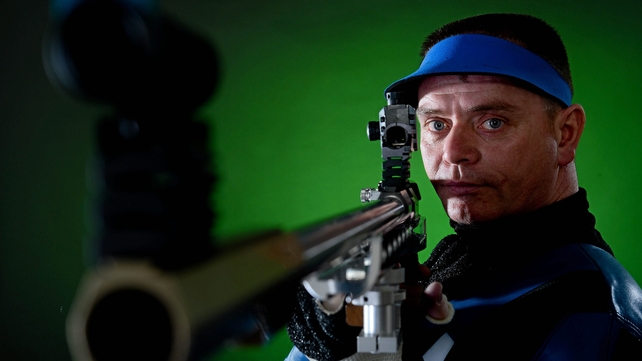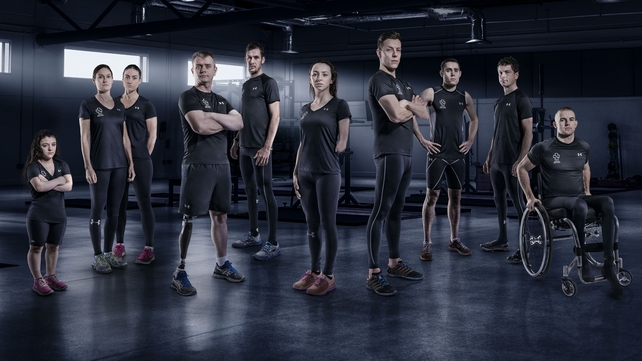In just over six months' time, Sean Baldwin will squeeze the trigger of his rifle at the National Shooting Centre in Rio de Janeiro and try to hit "a one-euro coin from the the width of a football pitch away".
The Kildare soldier, who became Ireland's first ever Paralympic shooting representative at London 2012, is back for more and can't wait for September's games.
“My ambition for Rio is to do my best. If I can do my best out there I can beat anyone," he told RTÉ Sport.
"I’ve four events to try and do that, I get a good run at the games.
"One of my events is three hours, 15 minutes long. That’s three positions. It starts off in a kneeling position, then you go into the prone, which is lying down, and then standing position. That’s the big event.
"I actually shot two off a world record but I didn’t make a final, that’s how good these athletes are"
“I do two events that are outdoors, 50m, and two events indoors that are 10m."
At this level, the margins between success and victory are fine enough to require a magnifying glass.
“It’s an elite sport," says the 48-year-old. "In a final it’s down to the width of your hair that’s going to win it. The bullseye at 10 metres is only half a millimetre, and that’s split into 10.
"I can’t see half a millimetre 10 metres away but that’s what I’m trying to hit. It’s like trying to hit a full stop. At 50m away, it’s the size of a euro coin at the width of a football pitch.
“We’re trying to hit that with our naked eye so it’s not like the movies where you have a scope and you can see it. But we can hit them.
“What we can see is a target the size of a saucer, so the centre of that disc is what we’re trying to hit,” he explained.

While on duty with the Irish Army's UN mission in Liberia in 2003, the Newbridge man was seriously injured in a car crash that claimed the life of his colleague Sergeant Derek Mooney. Sean lost his leg but survived.
“In November 2003 while I was working with the UN in West Africa, I was involved in a serious accident," he recalls.
"I lost my leg at the end of that but I had a lot more injuries and it took a long time to get back into action and to start walking again, because of the damage I had to my pelvis and so on."
Sean recovered and resumed his army career. He continued to compete in military shooting competitions but it was almost eight years later until he became aware of the opportunity to take part in the Paralympics.
“In 2011 I got involved because of a friend of mine, Liam Crawford, who introduced me to Paralympics Ireland. As luck would have it, we went off to Spain together and I shot very well over there.
“I actually shot two off a world record but I didn’t make a final, that’s how good these athletes are. You really want to be at the type of your game when you go up against them.
“In 2012 I got a wildcard to represent Ireland over in London. I was the first Irish shooter to qualify for that. I got the bug and set my targets then for Rio 2016."
Baldwin admits his day job was perfect preparation for a shooting competition but insists he's "a lot better!" shot than his colleagues.
“I’ve been a soldier since I was 17 and I’m still at that game. I’m loving every minute of it.
“Where I learned the fundamentals of shooting was in the military but this is a totally different different type of shooting. It’s real precision – down to the millimetre.
“Work is one thing; this is sport. It’s much much harder."

Baldwin describes being part of the 56-strong Irish panel as an inspirational experience and encourages the public to get behind Paralympics Ireland's 'More than Sport' campaign, which seeks to promote awareness of the athletes' journeys and raise vital funds for Brazil.
“Being part of Paralympics is amazing and being part of a team is even better," he says. "Being part of London 2012 was awesome and every day I get up in the morning thinking about 2016.
“In 2004 I knew nothing about Paralympics, and that was the year I was learning to walk again. In 2008 I still knew nothing about it. But I got involved then in 2011 and it’s been amazing ever since.
“Getting up in the morning, it gives you something to look at, every weekend, something to do. It really gets you up and gets your blood flowing.
"This campaign is to raise awareness of all the elite Paralympic athletes on their journey to 2016.
“Anything we can do to help another Paralympic athlete, or if we can find another Jason Smyth or someone like that out there, we want to bring them forward and get the word out there."

